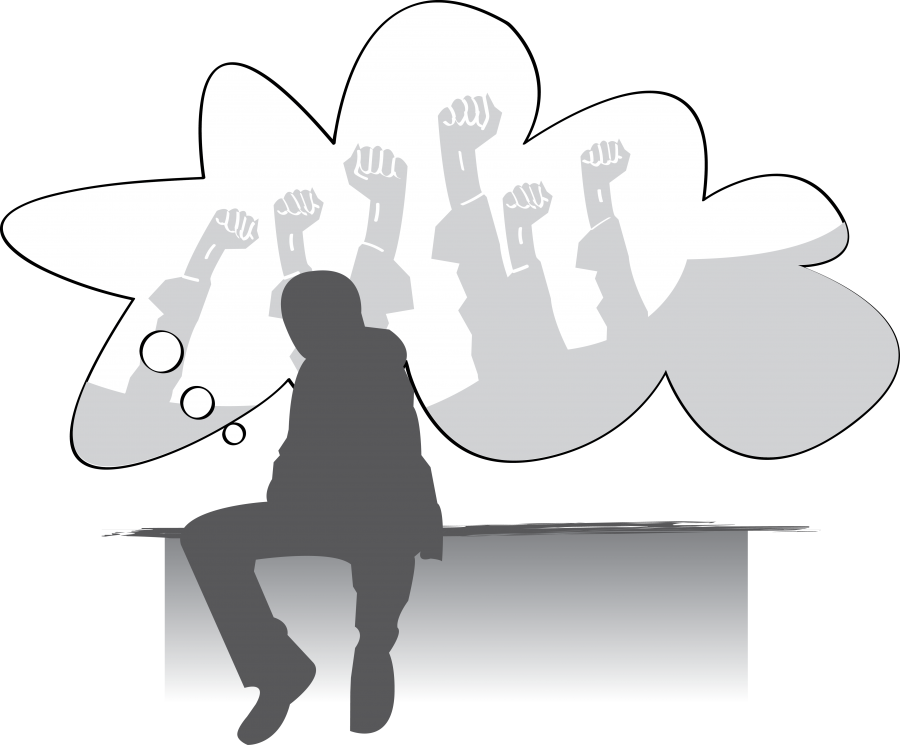Editorial: Handling long-term change
Use discourse to cope with events, not engender change
Especially when instances of alleged injustice and misconduct happen locally, rather than in a distant community, we are allowed to take time for ourselves to cope, reflect and process, in whichever way we choose to.
In the past few weeks, a student left Harker in a cloud of controversy, and a middle school teacher was accused of sexual misconduct. We’re all kind of messed up about this, and that’s okay. These situations suck. Let’s just admit it.
Basically, it’s hard to figure out what’s the “right” thing to say and think right now. Who are we supposed to side with? How can we express our opinion without being offensive? Which side is on the right side of history? The discourse is like a river. A river that’s spewing everywhere and we’re drowning in it.
With all of this pressure to be right, it’s easy to forget what should be all of our number one priority right now: grieving. It doesn’t really matter what the right thing to think is. What is important is that all of us talk it out in a civil manner and figure out how we feel. Discourse doesn’t have to be about activism – it can just as much be a coping mechanism.
And don’t get me wrong, there are people who take issue with grieving about this too. This isn’t the Syrian refugee crisis, or landmines in Laos they’ll say, so you’re not allowed to grieve.
Ignore them. We were blindsided and shocked and if you need to grieve to process, grieve to process. Talk or don’t talk. Cry or don’t cry. .
The thing is that there’s no right way to deal with this. There’s no solution to how you should cope, think, feel or discuss.
In journalism we like to say “afflict the comfortable, comfort the afflicted.” The first half is not as applicable here, but comfort and healing are too often sidelined. We don’t have to go out and fix the world all the time. Right now, all we need to do is take care of ourselves.
Grieve how you want. Grieve what you want. Do whatever you need to do to understand and deal with what has happened, and don’t let people tell you that your coping mechanisms are somehow inherently wrong, because if they work for you, that’s all that matters.
This piece was originally published in the pages of The Winged Post on October 11, 2016.

Kaitlin Hsu (11) is the Editor-in-Chief of Wingspan Magazine. In her freshmen year, she was a reporter, and in her sophomore year, she was the Features...


















![“[Building nerf blasters] became this outlet of creativity for me that hasn't been matched by anything else. The process [of] making a build complete to your desire is such a painstakingly difficult process, but I've had to learn from [the skills needed from] soldering to proper painting. There's so many different options for everything, if you think about it, it exists. The best part is [that] if it doesn't exist, you can build it yourself," Ishaan Parate said.](https://harkeraquila.com/wp-content/uploads/2022/08/DSC_8149-900x604.jpg)




![“When I came into high school, I was ready to be a follower. But DECA was a game changer for me. It helped me overcome my fear of public speaking, and it's played such a major role in who I've become today. To be able to successfully lead a chapter of 150 students, an officer team and be one of the upperclassmen I once really admired is something I'm [really] proud of,” Anvitha Tummala ('21) said.](https://harkeraquila.com/wp-content/uploads/2021/07/Screen-Shot-2021-07-25-at-9.50.05-AM-900x594.png)







![“I think getting up in the morning and having a sense of purpose [is exciting]. I think without a certain amount of drive, life is kind of obsolete and mundane, and I think having that every single day is what makes each day unique and kind of makes life exciting,” Neymika Jain (12) said.](https://harkeraquila.com/wp-content/uploads/2017/06/Screen-Shot-2017-06-03-at-4.54.16-PM.png)








![“My slogan is ‘slow feet, don’t eat, and I’m hungry.’ You need to run fast to get where you are–you aren't going to get those championships if you aren't fast,” Angel Cervantes (12) said. “I want to do well in school on my tests and in track and win championships for my team. I live by that, [and] I can do that anywhere: in the classroom or on the field.”](https://harkeraquila.com/wp-content/uploads/2018/06/DSC5146-900x601.jpg)
![“[Volleyball has] taught me how to fall correctly, and another thing it taught is that you don’t have to be the best at something to be good at it. If you just hit the ball in a smart way, then it still scores points and you’re good at it. You could be a background player and still make a much bigger impact on the team than you would think,” Anya Gert (’20) said.](https://harkeraquila.com/wp-content/uploads/2020/06/AnnaGert_JinTuan_HoHPhotoEdited-600x900.jpeg)

![“I'm not nearly there yet, but [my confidence has] definitely been getting better since I was pretty shy and timid coming into Harker my freshman year. I know that there's a lot of people that are really confident in what they do, and I really admire them. Everyone's so driven and that has really pushed me to kind of try to find my own place in high school and be more confident,” Alyssa Huang (’20) said.](https://harkeraquila.com/wp-content/uploads/2020/06/AlyssaHuang_EmilyChen_HoHPhoto-900x749.jpeg)



